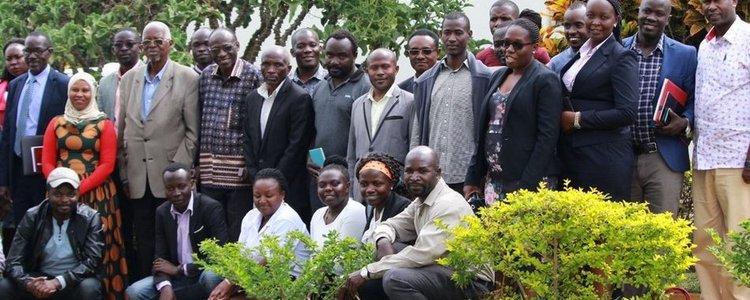The advanced academic partnership AER-Phase II is guided by three broad outcomes:
- Improved quality of teaching in MSc. Agroecology, taking into account gender diversity
- production of high quality participatory action research, and
- increased capacity of farmers to actively participate in the development and subsequent adoption of agroecological research innovations.
Under outcome 1, the conversion of teaching materials from textbook modules to audio-visual formats has started and so far 3 modules (i.e. Fundamentals of Agroecology, GIS and Remote Sensing and Gender Mainstreaming in Agroecology) have been converted to audio-visual formats and are currently being used by lecturers in teaching. Agroecology e-resources have been established and staff and students have been trained in the use of e-resources and reference software. In order to strengthen knowledge sharing, a pilot exchange was started based on joint courses within the Masters in Agroecology programme offered by MMU and UMU. As a result, 12 students and 1 staff member from UMU were hosted at MMU and joined by 5 students and 3 staff members from MMU. During the joint internship, the students visited 2 agroecology demonstrations and 1 organic farm in the Rwenzori region and jointly analysed key farm components and their interactions to reinforce the systems thinking perspective. Disability policy formulation at both MMU and UMU was initiated through stakeholder consultation workshops on the needs of people with disabilities in higher education institutions. The information was used to inform the first drafts of the disability policies at both MMU and UMU. In addition, a two-day gender-focused training was conducted, facilitated by Nikoleta Nikisianli from BOKU and attended by 13 participants at MMU and 11 participants at UMU. This is a start of the gender sensitisation trainings planned for the second year of the project.
Under outcome 2, the formulation of the agroecology research agenda was kickstarted with a multistakeholder workshop that was attended by 25 people including practitioners, academics, extension workers and farmer representatives. The workshop gathered stakeholder views on pertinent issues that should be included in the agroecology research agenda. Additionally, one 3 day training on writing PhD research concepts was organized for 3 days mainly targeting MMU staff who have an ambition of pursuing a PhD. With regards to the local master scholarships, an all-inclusive selection criteria was developed through a series of online joint partner meetings and also individual partner meetings. MMU was able to conduct interviews and offer 4 scholarships and research grants to the deserving students based on the set criteria while UMU is in the selection process. Several planning meetings were also held within MMU and UMU to plan for the university demonstration farms and plan for their upgrades and utilization as practical teaching and research facilities. For instance, the institutional demonstration farms have been restocked with livestock, an eco-sanitation toilet was built and several livestock structures were rehabilitated among other upgrades.
Under Outcome 2, the formulation of the agroecology research agenda was initiated with a multi-stakeholder workshop attended by 25 people, including practitioners, academics, extension workers and farmer representatives. The workshop gathered stakeholder views on relevant issues to be included in the agroecology research agenda. In addition, a 3-day training on writing PhD research concepts was organised, mainly for MMU staff with PhD aspirations. For the local Masters Scholarships, a comprehensive selection criteria was developed through a series of online joint partner meetings and also individual partner meetings. MMU was able to conduct interviews and offer 4 scholarships and research grants to the deserving students based on the set criteria, while UMU is in the selection process. Several planning meetings were also held within MMU and UMU to plan for the university demonstration farms and to plan for their upgrading and use as practical teaching and research facilities. For example, the institutional demonstration farms have been restocked with livestock, an eco-sanitation toilet has been constructed and several livestock structures have been rehabilitated, among other upgrades.
